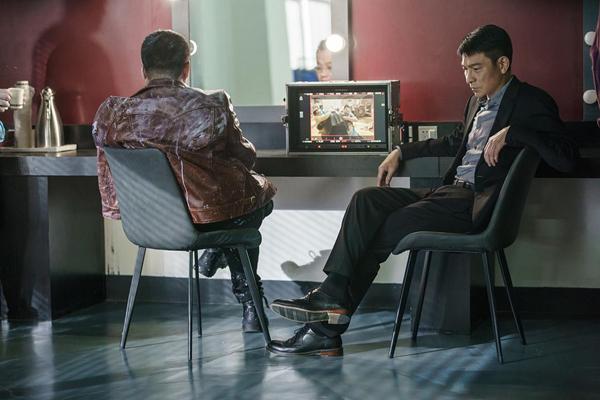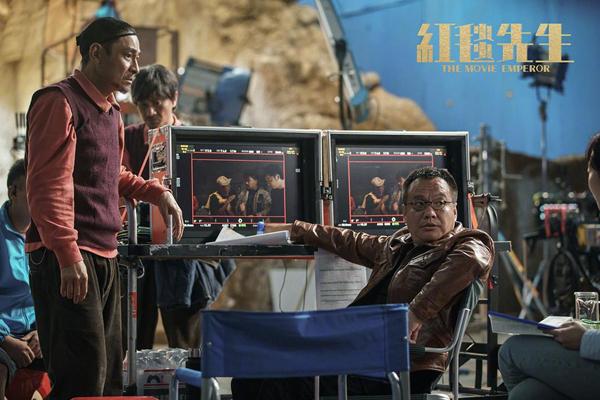
 0 Comment(s)
0 Comment(s) Print
Print E-mail China.org.cn, February 15, 2024
E-mail China.org.cn, February 15, 2024
In a remote villa in suburban Beijing, director Ning Hao sat down with China.org.cn and started with a philosophical note. "I feel the hardest part of communication between people is that they don't see things from others' perspectives and are unwilling to understand their counterparts," he said.

Director Ning Hao (left) and actor Andy Lau in a scene from "The Movie Emperor." [Photo courtesy of Super Lion]
"And why can't they understand each other? Because each of them has their own obsessions," he added. "Without communication, there will be conflict and confrontation, especially when you don't see the big picture."
He then discussed his latest film, "The Movie Emperor," which has been screened at various foreign and domestic film festivals and has received rave reviews. Unlike Ning's previous wild and raucous comedy productions, this film, released nationwide on Feb. 10, adopts a more minimalist and sophisticated comedic approach, sometimes reminiscent of high-end arthouse films.
Fascinated by the topic of human communication, he was inspired to make a film centered on this theme. In the film, he incorporates news broadcast voiceover clips about a foreign war in several scenes to underscore the disastrous consequences of miscommunication.
Making this film also served as a way to repay Hong Kong megastar Andy Lau, who backed Ning's early success with "Crazy Stone" 17 years ago.
For years, Lau had been seeking an opportunity to collaborate again, but Ning's subsequent hits, like "Crazy Racer," "No Man's Land," and "Crazy Alien," continued to focus on "crazy" narratives centered around grassroots characters . These films did not quite fit Lau's established and elegant persona. Nearly two decades later, Ning finally developed an idea for a comedy film that would allow Lau to shine authentically.
But it's not exactly the Lau we've known. In "The Movie Emperor," Andy Lau portrays movie star Lau Wai Chi, a name that nods to fellow Hong Kong megastars Tony Leung Chiu-wai and Stephen Chow Sing-chi. The protagonist is desperate to win the best actor award at an international event, so he teams up with a director, portrayed by Ning, to create an art-house film in the Chinese countryside. He believes the foreign award jurors will readily favor stores like these, a nod to an interesting irony the director observed at global movie festivals. As a result, Lau tries to immerse himself in rural life, but unexpected events, meddling investors, internet scrutiny, and his own ego turns this endeavor into a farcical debacle.
Ning recalled that Lau was initially hesitant when he first talked about the film with him. "He wasn't quite clear about what I was going to do, and he had never played a character so close to his real self before. He was worried that the audience might misinterpret it. But after reading the script, he recognized it as a compelling story, albeit one inspired by his own experiences."
This self-deprecating comedy playfully satirizes China's film industry, offering a light-hearted parody of its glamorous vanity. Yet, Ning still maintained that the inclusion of hooks, memes, and plotlines reflecting real-life events in the film industry is designed to serve the film's narrative and follow the rules and logic of drama.

Director Ning Hao (right) and actor Andy Lau in a scene from "The Movie Emperor." [Photo courtesy of Super Lion]
The director described himself as not being particularly fond of acting, but he decided to act in the film since it is a self-mockery project, believing that he should laugh not only at others but also at himself. After the success of his previous Spring Festival sci-fi comedy "Crazy Alien," which earned 2.21 billion yuan ($310 million), Ning said he hoped his return to the film season would be a special treat for audiences. "For the Spring Festival, you should try different dishes. 'The Movie Emperor' is unique. It's fun but also thought-provoking. However, if you don't want to overthink, you can still have fun!"
Ning admitted he still feels a sense of powerlessness regarding the movie's theme. "Sometimes, I'm pretty pessimistic. Even if you want to communicate with someone, that person may not want to communicate with you. Nowadays, the biggest feature of our era is how self-centered people are. This film will show various scenarios, but I don't have the answer. I hope it encourages reflection and better communication."
Go to Forum >>0 Comment(s)